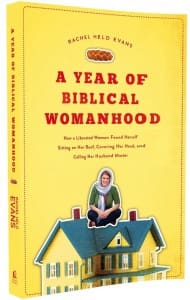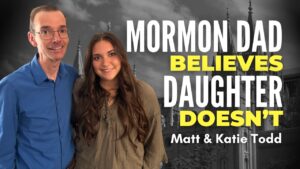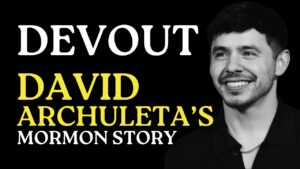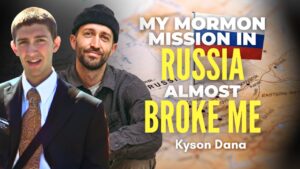 As the 9th feature of our Mormon Stories Book Club series, we feature Rachel Held Evans and her book A Year of Biblical Womanhood. Rachel Held Evans, from Dayton, Tennessee, is an American Christian columnist, blogger, and author of two books, A Year of Biblical Womanhood and Evolving in Monkey Town. You can read about all of Rachel’s fabulous and impressive pursuits on her blog . I was nervous to reach out to Rachel and invite her to be on Mormon Stories podcast. Rachel’s book is, after all, a New York Times best seller, and Rachel is, well, not a Mormon. Rachel put us all at ease right away, however, and was warm and friendly. For me, talking with her confirmed that we—evangelical Christian women and Mormon women—have much in common. I look forward to having more dialogues like these with our sisters from other faiths.
As the 9th feature of our Mormon Stories Book Club series, we feature Rachel Held Evans and her book A Year of Biblical Womanhood. Rachel Held Evans, from Dayton, Tennessee, is an American Christian columnist, blogger, and author of two books, A Year of Biblical Womanhood and Evolving in Monkey Town. You can read about all of Rachel’s fabulous and impressive pursuits on her blog . I was nervous to reach out to Rachel and invite her to be on Mormon Stories podcast. Rachel’s book is, after all, a New York Times best seller, and Rachel is, well, not a Mormon. Rachel put us all at ease right away, however, and was warm and friendly. For me, talking with her confirmed that we—evangelical Christian women and Mormon women—have much in common. I look forward to having more dialogues like these with our sisters from other faiths.
The first segment features Rachel, accompanied by podcast host Heather Olson Beal and readers Erin Hill and Stephanie Lauritzen. The second segment features just Heather, Erin, and Stephanie talking about Mormon connections, links, and reactions to Rachel’s book. Please support Mormon Stories by purchasing A Year of Biblical Womanhood through this link. A small amount of the proceeds go to help support Mormon Stories.




10 Responses
I loved this interview. I love the concept that our relationship with God is more important than our “role” as a woman (Rachel said it better I just can’t remember her phrasing).
My sister-in-law is Russian and a convert. Sometimes we talk about these kinds of issues int he church and she always finds it humorous because these aren’t really issues in the International LDS culture. At least not so much in Europe. I don’t think she ever thought of herself as a feminist or progressive until she moved here to the US and was told she is.
For multiple reasons, mainly cost of living, its just common for women to work. It’s not just Russia either because she has lived in other countries in Europe. That was my experience when I lived in Asia. It’s like there isn’t really a concept of “homemaking”. Just curious if any other non-US women or anyone that has lived outside the US has found this is the case. The “ideal” life for women is to get an education and a career to support the family.
What is the root of this in the US? Is it our Puritan roots? Just that we are more religious/conservative in the US? I think that is the conclusion.
I LOVED this book and was so happy to see that Mormon Stories was featuring it. I so appreciated Rachel Held Evan’s insights and thoughts on the podcast. Favorite part of the book by far was the clarification on Eshet Chayil, which calls us to celebrate the accomplishments and power of woman NOW, as they ARE, instead of what they always “should be”.
However, part II of the podcast was a total disappointment for me. For all the talk in part I of how the panel supposedly supports this notion of celebrating all women in every walk of life, the conversation was quickly reduced to gross over-generalizations and furthering the false dichotomy of “Mormon-stay-at-home-mommy-blogger-type” caricatures versus us “real women”.
The whole conversation revealed more about personal insecurities than it did any service to encouraging fellow women to sound the call “Women of Valor” in ALL roles we assume. Also, why – after all the talk of stay at home moms and “those” type of women who excel at “pie baking”- etc. – could we not have featured one in the conversation? Or is it so embedded in our assumptions that those “types” wouldn’t appreciate this sort of academic, elevated discussion? It seems to me the only women representing some “women’s” perspectives in this discussion were women who work outside the home and don’t have any particular inclination towards domestic endeavors (not that there is any problem with that at all…but I figured that if you’re going to create and discuss these straw-women “others” who bake pies and use a DSLR camera, you might want to find one and actually engage her in the panel?)
I would have appreciated some elaboration on where it is regularly emphasized and preached over the pulpit that a woman must be an anthropology wearing, photographer professional who blogs for a living from home? I heard it multiple times on the podcast that this is the “new expectation” of the homemaker. Even culturally, I disagree with your generalization that this is the new expectation. Two on the panel might FEEL that way, but are feelings and personal anecdotes the only reliable indicator of what is actually occurring? Is that simply what the panelists choose to focus on? Maybe reading one too many of those Mormon Mommy blogs? The Mommy blogger type might POPULAR on a secular level, but it is such a NON SEQUITUR to now assume that it is now the only endorsed position of Mormon culture at large. However, on that note, why wouldn’t you be willing to celebrate the achievements of a fellow woman who excels at photography, has an eye for fashion, connects to society at large (who enjoy her work and expression of self) and as a consequence of her natural talents and abilities ends up getting paid to do it? Why does that then immediately translate to “this is what is now expected” of ALL Mormon women? I don’t follow understand the logic behind this.
Sorry, this lengthy comment is not intended to be some apologetic diatribe for the cultural phenomena coined Mormon Mommy Blogs, but I just cannot help but notice that the panel is obviously projecting personal insecurities onto a scapegoat of a self constructed narrative of an entire Mormon “culture”.
Additionally, I think there is simply a difference of emphasis occurring in the discussion. Julie B. Beck’s “Mothers who Know” conference address was touted by the panel as the poster child example of how it is preached that stay-at-home-motherhood and homemaking are the ONLY acceptable roles in the eyes of God. Again, that was not the message I received from this talk. While you zeroed in and focused solely on one section of the talk and repeatedly dissected the buzz words “homemaking” and “house of order”, a closer look will reveal that by “house of order” she was referring to D&C 109 (which she specifically cited in the talk), which has a much broader and more expansive definition of a “house of order” than what you reduced her words to mean: which was simply equated to, to paraphrase one panelist’s comments, cleaning your home even at the expense of teaching your children about Christ. ? Seriously? Is this the model of thoughtful conversation we women are modeling? Not to mention Beck goes on to say mothers who know are LEADERS, and TEACHERS, etc.
I guess I felt compelled to comment because I cannot help but take issue with the rather snarky, dismissive, ungenerous comments made throughout part II of the podcast that really made all the talk of Eshet Chayil! in Part I seem rather hypocritical.
That is my two cents. I have to finish by saying that I love Mormon Stories and hope you keep up the good work. Even when I do find myself in disagreement with certain perspectives on occasion, I find this to be an engaging outlet. Thanks!
Thank you Elizabeth,
Your post is very insightful, I know very well that the panel really wanted to do express their views and giving voice to the more progressive sisters and I applaud them for helping those of us who really need to hear that voice, yet as you pointed out it came across as dismissive to a more conservative view of those sisters that value Julie Becks counsel. I think their views could be deep and warm and useful even if it does not line up with a more conservative point of view. I value progressive prospective, yet become discouraged when he is presented in the wrong spirit.
My wife fits the Julie Beck model, and loves the Gospel will all her heart and is gentle and loving to all sisters and their varied views of the gospel and womanhood. Hope these discussion brings us together so all will feel welcome and love of the Savior in all sister lives.
I think it would be good to bring this panel together again and invite a more conservative women to participate and talk about bridging the gap we sometimes feel from each side.
(*Edited comment)
I LOVED this book and was so happy to see that Mormon Stories was featuring it. I so appreciated Rachel Held Evan’s insights and thoughts on the podcast. Favorite part of the book by far was the elaboration on Eshet Chayil, which calls us to celebrate the accomplishments and power of women NOW, as they ARE, instead of what they always “should be”.
However, part II of the podcast was a total disappointment for me. For all the talk in part I of how the panel supposedly supports this notion of celebrating all women in every walk of life, the conversation was quickly reduced to gross over-generalizations and furthering the false dichotomy of “Mormon-stay-at-home-mommy-blogger-type” caricatures versus us “real women”.
The whole conversation revealed more about personal insecurities than it did any service to encouraging fellow women to sound the call “Women of Valor” in ALL roles we assume. Also, why – after all the talk of stay at home moms and “those” type of women who excel at “pie baking”- etc. – could we not have featured one in the conversation? Or is it so embedded in our assumptions that those “types” wouldn’t appreciate this sort of academic, elevated discussion? It seems to me the only women representing some “women’s” perspectives in this discussion were women who work outside the home, positively affiliate with the title feminist, and don’t have any particular inclination towards domestic endeavors (not that there is any problem with any of those characteristics AT ALL…but I figured that if you’re going to create and discuss these straw-women “others” who bake pies and use a DSLR camera and are thoughtless subservient puppets to patriarchal authority, you might want to find one and actually engage her in the panel?)
I would have appreciated some elaboration on where it is regularly emphasized and preached over the pulpit that a woman must be an anthropology wearing, photographer professional who blogs for a living from home? I heard it multiple times on the podcast that this is the “new expectation” of the homemaker. Even culturally, as a Mormon woman, I disagree with your generalization that this is the new expectation. Two on the panel might FEEL that way, but are feelings and personal anecdotes the only reliable indicator of what is actually occurring? Is that simply what the panelists choose to focus on? Maybe reading one too many of those Mormon Mommy blogs? The Mommy blogger type might be POPULAR on a secular level, but it is such a NON SEQUITUR to now assume that it is now the only endorsed position of Mormon culture at large. However, on that note, why wouldn’t you be willing to celebrate the achievements of a fellow woman who excels at photography, has an eye for fashion, connects to society at large (who enjoy her work and expression of self) and as a consequence of her natural talents and abilities ends up getting paid to do it? Why does that then immediately translate to “this is what is now expected” of ALL Mormon women? I don’t follow understand the logic behind this.
Sorry, this lengthy comment is not intended to be some apologetic diatribe for the cultural phenomena coined Mormon Mommy Blogs, but I just cannot help but notice that the panel is obviously projecting personal insecurities onto a scapegoat of a self constructed narrative of an entire Mormon “culture”.
Additionally, I think there is simply a difference of emphasis occurring in the discussion. Julie B. Beck’s “Mothers who Know” conference address was touted by the panel as the poster child example of how it is preached that stay-at-home-motherhood and homemaking are the ONLY acceptable roles in the eyes of God. Again, that was not the message I received from this talk. While you zeroed in and focused solely on one section of the talk and repeatedly dissected the buzz words “homemaking” and “house of order”, a closer look will reveal that by “house of order” she was referring to D&C 109 (which she specifically cited in the talk), which has a much broader and more expansive definition of a “house of order” than what you reduced her words to mean: which was simply equated to, to paraphrase one panelist’s comments, cleaning your home even at the expense of teaching your children about Christ. ? Seriously? Is this the thoughtful conversation we women are modeling? Not to mention Beck goes on to say mothers who know are LEADERS, and TEACHERS, etc.
I guess I felt compelled to comment because I cannot help but take issue with the rather snarky, dismissive, ungenerous comments made throughout part II of the podcast that really made all the talk of Eshet Chayil! in Part I seem rather hypocritical.
That is my two cents. I have to finish by saying that I love Mormon Stories and hope you keep up the good work. Even when I do find myself in disagreement with certain perspectives on occasion, I find this to be an engaging outlet. Thanks!
Thanks for listening. I’m glad you liked the first part (and I agree, Rachel is a gem!) and sorry you didn’t like the second. Regarding your critique that we should have had a stay-at-home mom on the panel, all I can say to that is that this is a volunteer gig that I do in the wee hours of the night sometimes, so I’m thrilled to have whatever kind of people I can who are willing to read the books and be on the podcast with me. I love Erin and Stephanie and don’t at all agree with your descriptions of and reactions to them (or to me), but I would also have been happy to have had a stay at home mom on the podcast. Alas, no one volunteered so we went with who we had!
Keep listening! And, if you want to suggest a book or want to be on a panel, email me, please!
I agree with the previous comment. The author was gracious and emphasized the importance of Christian discipleship. The second portion came across as snarky and self-absorbed. With all of the criticism of patriarchy, it really seems that most of the issues/criticism come from other women. I don’t know if I have ever heard a man complain that his wife doesn’t have a blog.
I think it is great to reach out to similar believing cultures in and see the similar issues. The Sisters in the second part of the discussion can learn a few things about presenting this subject in a respectful way rather than lowering the value of the discussion, due to their obvious disdain for more conservative culture represented by “Julie Beck”. The church I grew up in always encourage independent prayerful thinking, testing by personal revelations by the sisters of the church. I always find it interesting to see how the more progressive thinks they have “right thinking patterns” vs. the More conservative counter part. I find these podcast to be over all good and healthy, I as a more traditional Mormon learn to see different angles, views and thinking, discard some respectfully and rejoices in the progressive thoughts that inspire me to be more thoughtful an accepting, truly a Christ like prospective that progressive thinking brings. I also rejoice in my more traditional, conservative thoughts to grounds me to a more solid footing that keeps me from destructive winds of a more permissive culture.
Thanks for the delightful interview! I read Rachel’s first book a year ago and found her thoughts well articulated and easy to relate to.
To All: thank you for your words and clear expressions. As an LDS man, you gave me more to think upon.
Stephanie: I heard you speak at The 2012 MS Conference, Wasatch Presbyterian, SLC UT; and I am still thinking about what you said and how you said it. Kudos again.
This was a fantastic interview. I haven’t been able to read this book yet, but I really appreciate the discussion on Women of Valor! What a beautiful idea. It is powerful. Thank you!